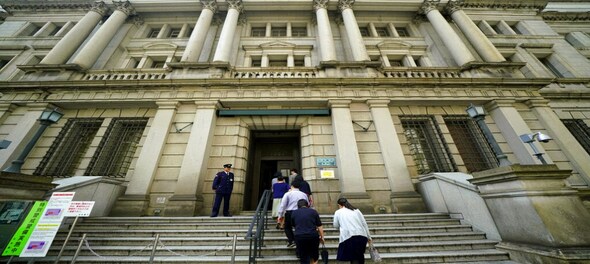
Japan’s latest inflation report gives the Bank of Japan another reason to wait beyond next week’s meeting before ending the negative rate policy, while also adding to the case for a hike in coming months.
Growth in consumer prices excluding fresh food slowed to 2.3% in December from a year earlier, matching consensus, the internal affairs ministry reported Friday. Deeper drops in electricity and gas prices and a slower pace of gains for processed food weighed on the index.
For a second month, prices for services rose 2.3%, the fastest pace in three decades excluding periods distorted by sales tax hikes.
The data support the view that there’s no pressing need for the BOJ to rush into making its first rate hike since 2007 at its January meeting, with April touted by many economists as the most likely month.
Friday’s data are the latest indication that cost-push inflationary pressure in Japan is easing, in line with what the BOJ has predicted would happen. Previous data showed that the December producer price index was flat versus a year earlier, the weakest showing in almost three years. Consumer price gains in Tokyo the same month eased to the slowest in over a year.
“Cost-push inflation has eased a bit, but whether this will transfer into demand-pull inflation can’t yet be confirmed,” said Yuichi Kodama, chief economist at Meiji Yasuda Research Institute.
The price data aren’t expected to push the BOJ from its path toward eventually normalizing policy. The 2.3% rise in service prices is an indication that underlying inflation may be moving beyond temporary cost-push factors.
“The ongoing deceleration in inflation doesn’t mean that BOJ’s normalization is off the table,” said Taro Saito, head of economic research at NLI Research Institute. “I don’t think inflation will be as strong as the BOJ expects but it’s going to settle somewhere between 1% and 2% and the BOJ will probably keep forecasting it to be around 2% so they can change policy.” He sees April as the likely month for a hike.
Economists surveyed by Bloomberg unanimously predict the BOJ will keep its negative rate at a meeting concluding on January 23, as authorities are still assessing the impact from a New Year’s Day quake that struck the nation’s northwest coast.
The bank will also publish an updated quarterly outlook at the meeting with board members likely to discuss cutting their forecast for core CPI in the fiscal year from April to around 2.5% from 2.8% due to falling oil prices, people familiar said.
Friday’s report showed prices for electricity and gas fell by almost 21% in December from a year earlier. Subsidies for electricity and gas shaved 0.49 percentage point off the overall inflation figures. Prices of processed food rose at a slower pace of 6.2%. Among outliers, prices for lodging soared 59%, reflecting the end of a separate government subsidy and stronger demand from resurgent inbound tourism.
A deeper measure of inflation that strips out fresh food and energy prices decelerated to 3.7%, also in line with forecasts. Some economists have said this measure of prices is a truer indication of where inflation lies as it factors out volatile energy prices that have also been affected by government subsidies.
Check out our in-depth Market Coverage, Business News & get real-time Stock Market Updates on CNBC-TV18. Also, Watch our channels CNBC-TV18, CNBC Awaaz and CNBC Bajar Live on-the-go!


'Borrowed' leaders: Congress hits out at AAP for not fielding their own candidates in Punjab
Apr 28, 2024 9:53 PM
EC asks AAP to modify election campaign song and Kejriwal's party is miffed
Apr 28, 2024 9:25 PM

